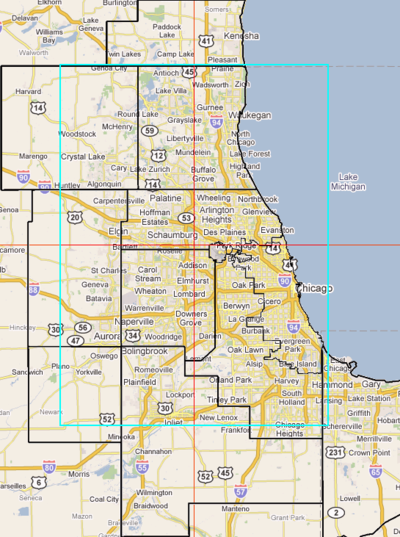Chicago, Illinois
| Schaumburg | - | - |
| Aurora | Chicago, Illinois | - |
| Champaign/Urbana | - | - |
[[Category:Meetup in {{{lat}}} {{{lon}}}| ]]
The Chicago, IL graticule is located at latitude 41, longitude -87. It includes almost the entire city proper (excluding the area north of Devon Ave), the south suburbs, Kankakee, Gary and NW Indiana.
Proposed graticule shift
Chicago is not entirely in one graticule. The northern part shares a second graticule with much of the suburbs, Kenosha, and southern Milwaukee. Since this graticule is mostly Lake Michigan, it will be rare that it gets to meet. The Chicago graticule also excludes many of the suburbs. A possible solution to this problem would be using a shifted graticule divided on the half-degree lines extending from 41.5 to 42.5 degrees north and from 87.5 to 88.5 degrees west. This would be a smaller proportion lake than either of the two Chicago graticules. It would also be almost entirely contained within Illinois. The proposed area would include very nearly all of Cook County, as well as all of DuPage and Lake Counties, most of Kane, Kendall, McHenry, and Will Counties, and very small parts of Indiana and Wisconsin. This would include all the important cities of the Chicago area, including Chicago, Aurora, Elgin, Evanston, Joliet, Naperville, Schaumburg, and Waukegan. It would exclude Kenosha and Gary, but they are in other states. Also, this would separate Chicago from Milwaukee.
Four-graticule proposal
Another possible solution would be, in addition to the Chicago graticule, to consider the three graticules immediately to the west, northwest, and north of it, and out of those four locations, select whichever is closest to the city center (and is not underwater). This solution was first proposed by "Gylbert" on the xkcd Blag, though in relation to Calgary, not Chicago.
Notable Dates
2008-05-22 - Offers an example for a simple solution to both the divided graticule and dihydrogen monoxide issues: why not shift the meeting point to the nearest solid ground? In this case, it would be the eastern tip of Navy Pier. This would only be a problem for those who are more allergic to tourists than to Great Lakes-sized quantities of H2O. — Kevin Forsyth
